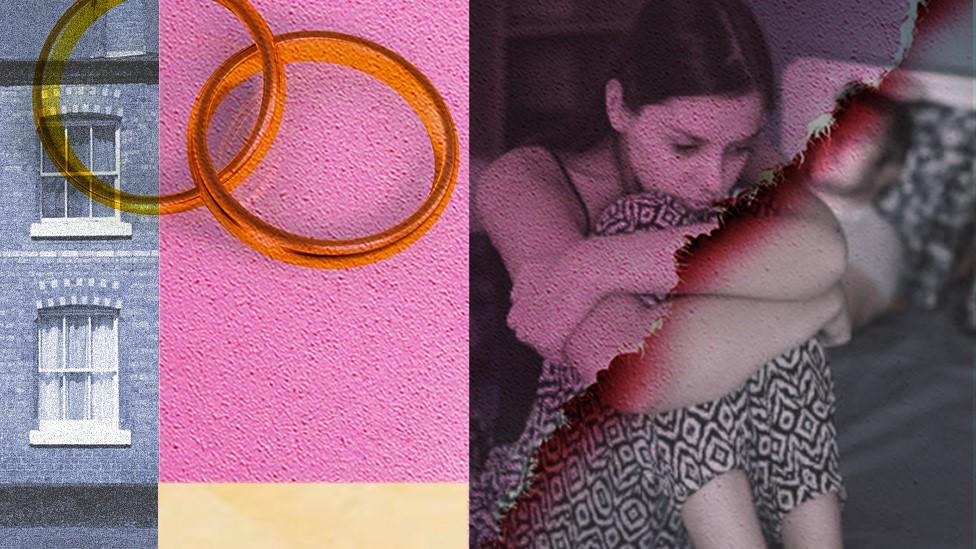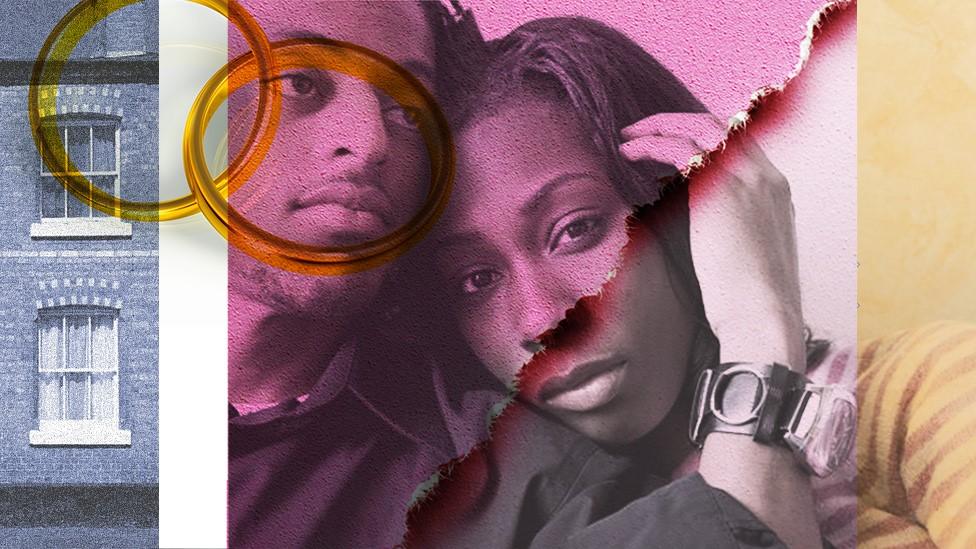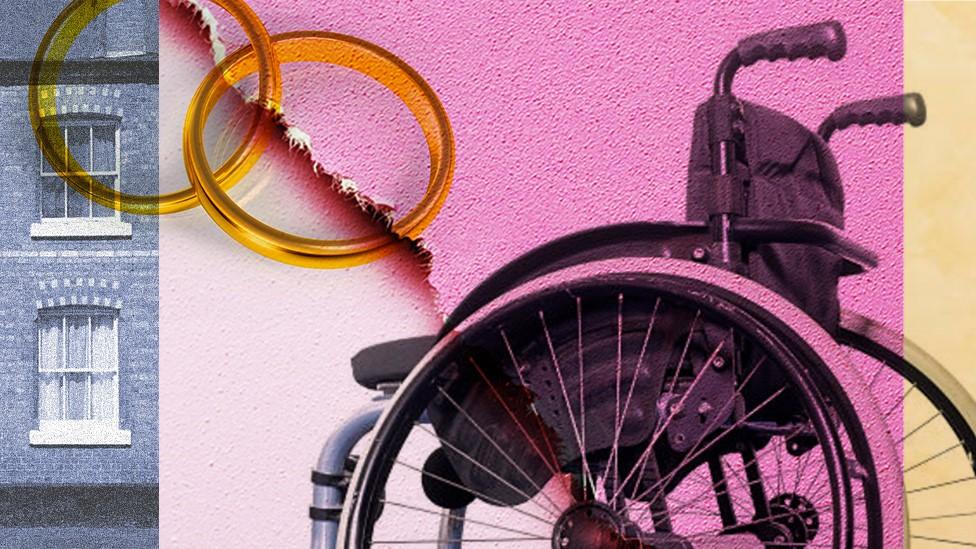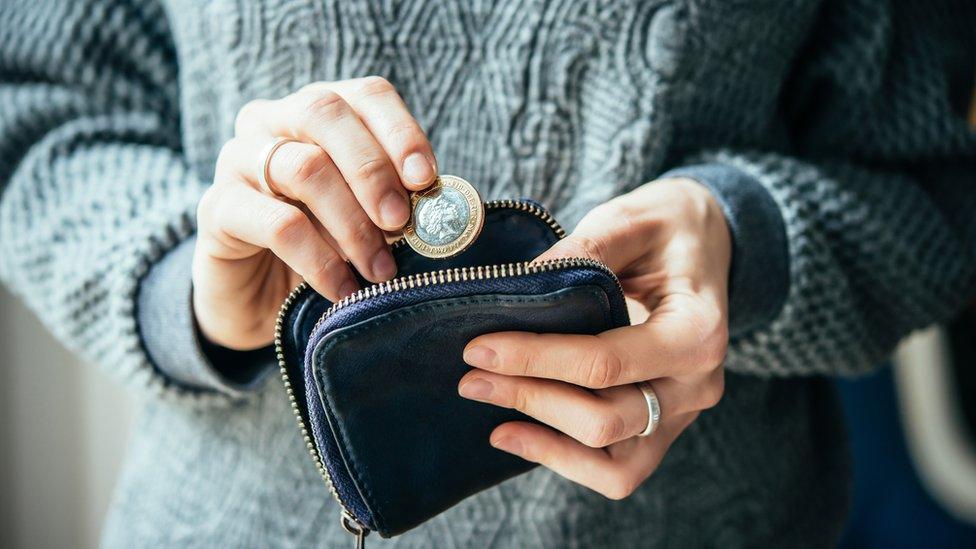Benefits and disability: 'I'll never cohabit again, to protect myself'
- Published

Benefits exist to support people in times of need. But for some disabled people, household means-testing has led to benefits being taken away making them uncomfortably reliant on their partner and in debt due to the extra living expenses disabled people incur. Rachel Charlton-Dailey finds some people have vowed never to marry or cohabit again.

"I knew he wasn't going to support me," says Emma*, from Essex, who had early anxieties about her relationship.
The 32-year-old and her boyfriend had been together for two years when they decided to take their relationship to the next level.
Emma moved out of her home and into his. She was excited but living together meant that her income-related Employment and Support Allowance (ESA) was immediately stopped.
ESA is granted to adults who struggle to find work because of illness or disability.
Emma, who has fibromyalgia, ulcerative colitis, and a visual impairment, is unable to work and received £114.10 a week when she lived alone. But when she moved in with her boyfriend, their income and savings were taken into consideration jointly, meaning Emma no longer qualified.
From that point onwards, she was expected to rely financially on her partner.
"I never wanted him to support me but being ineligible for benefits put me in a vulnerable position," she says.
They agreed to split the cost of living - Emma would pay a third, using her savings to do so, while her partner would pay two-thirds, but this soon changed the dynamics of their relationship.
"He earned five times more than I did and he held it over me. I was still scraping pennies together," she says.
"I relied on him for daily tasks a lot so it was a toxic addition to our relationship because he was only interested in caring for me under his terms. He'd only buy food he liked. Whatever worked for him had to work for me."
Emma says the relationship became physically and sexually abusive and, looking back, he had used coercive control to isolate her from friends and family.
But with no income, she was unable to leave. And if she did leave it could take several weeks for her to be re-assessed and paid ESA once more and she wouldn't have a roof over her head.
"When I felt the relationship was over, my second thought was 'you can't afford to lose this relationship, you have nowhere to go'."
According to SafeLives, a domestic abuse organisation, disabled people typically experience abuse for an average of 3.3 years before seeking support, compared with 2.3 years for non-disabled people. After receiving support, disabled victims are 8% more likely to continue to experience abuse.

While means-testing is a widely used tool to determine how much money people should get from the benefits system, the impact of benefit reductions can be greater on disabled people because of the additional daily living expenses they have.
Extra costs like specialist equipment, powered wheelchairs, or taxi rides can set disabled people back £583 per month on average, according to the charity Scope.
This is true for Billie*, 29, from Carlisle, who has ME and Ehlers-Danlos syndrome, which affects connective tissue and can cause pain and fatigue. She relies on taxis to get to her regular hospital appointments.
Covid-19 saw her lose her financial independence when she was furloughed from a local entertainment venue. She qualified for ESA to top-up her payments, but when her household's income was taken into account, she lost money every time her partner was rewarded at work.
"If he so much as earns £50 more for doing a tiny bit of extra work or getting his petrol covered then my payments decrease," she says. "It got cut down even more in December when he got a brief 'pay rise' also known as a £100 Christmas bonus.
"This can be infantilising for disabled people, as though we can't have our own money," Billie says. "It also means disabled people can't live with or marry their partners for fear of losing their only income source."
As well as ESA, Billie received £490.20 per month through another benefit, Personal Independence Payment (PIP), which is given to people with long-term health conditions in order to cover extra living costs. It is not means-tested or affected by any other benefits you might qualify for, but Billie says they were still "scraping by" and sometimes struggled to buy food.
"The system sets us up to fail. I don't want to be dependent on my boyfriend. I should be able to give my half, not being subbed like a child," she says. "If you hit a bad patch and can't work as much you're kind of screwed."
The current system has left some disabled people feeling they have to choose between relationships and financial security.
The Disability Benefits Consortium (DBC), a strong network of over 100 charities and disabled people's organisations, wants this changed.
Geoff Fimister, its policy co-chair, says means-tested benefits can result in a disabled person being "forced to be dependent on a non-disabled partner".
He says Covid-19 has likely made the situation worse and the pandemic is a "sharp reminder that there are unresolved equality issues".
The DBC says it wants to see disaggregation - where means-testing would be taken out of the assessment and be based solely on the individual's need.

It is this current inequality that Kelly*, 26, from Leeds, says she faced when her marriage meant gaining a husband, but losing her income.
"Nobody told me I'd lose my money when we got married and moved in together," she says.
Kelly has EDS, Endometriosis, ADHD and uses a wheelchair. She relied on ESA as she is unable to work and didn't live with her now-husband before they married.
Due to illness and a mix-up with appointments, she didn't report her marriage for a month and assumed everything was fine.
Then, a dreaded brown envelope from the Department for Work and Pensions (DWP) landed on her doormat.
"I got a letter claiming I hadn't reported my marriage, they'd overpaid me and I had to pay them a month's worth of ESA back and they'd decided to add a £50 fine on top. They were asking for about £350 while at the same time telling me I had no claim to ESA because my husband worked."
Kelly had no idea her benefit payments would stop because of her husband's income and was at a loss when they did.
She was moved on to another means-tested benefit - Universal Credit - which disabled people are advised to apply for if they don't qualify for ESA. But she says that doesn't feel stable because their household income fluctuates each month and affects her payments.
Kelly has had the benefit stopped twice already, due to her husband's wages coming in early at Christmas.
"We are punished simply for getting married and it feels so unfair that if I was abled and working it wouldn't matter."
The couple have struggled to pay bills and relied on Kelly's parents for loans.
The DWP said: "Universal Credit and ESA provide a welfare safety net for those in most need, and as such it's right that household income and savings are taken into account when assessing eligibility for these benefits."
Emma managed to escape her situation when her partner ended the relationship.
But it has left her wary.
"I had become partially financially reliant on him purely because the government had stripped my right to benefits for daring to cohabit with a partner. It felt humiliating once I finally realised how vulnerable I'd been.
"In the future, I don't plan on ever living with a partner again, to protect myself."
*All names have been changed and those receiving ESA in this article are in receipt of income-based ESA which, although widely still in-use, can no longer be applied for by new applicants.

Related topics
- Published6 February 2020

- Published14 November 2019
